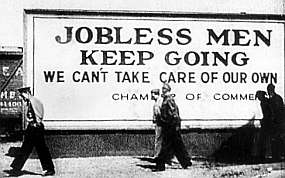Since my last post, I’ve been struggling. No, not with some metaphysical angst like you’ve come to expect. Instead, I’ve been trying to manage the sheer amount of need I continue to encounter in the lives of others.
Regular readers know that my family’s health insurance company pulled out of the market after the Health Reform Bill passed. They simply terminated our policy and told us Obamacare would take care of us…four years from now. Circumstances make a 1:1 replacement impossible. While we may have found a solution (praise the Lord!), it’s still more tenuous than I would like. The wrong kind of diagnosis or procedure could find the chink in the insurance armor and wipe us out financially.
Reports keep rolling in from all over of other people who face enormous medical bills or can no longer afford or qualify for health insurance. A relative recently got a $4,000 bill for a simple MRI. That’s one big chunk o’ change most people don’t have lying around. Given the median household income in America, that bill for one test comes close to 7 percent of the entire household income for the year. Adding that the savings rate is negative, with people spending more than they earn, where’s the rainy day fund to pay for that MRI?
What made my relative’s situation all the more aggravating is that the MRI was inconclusive. A $4,000 swing-and-a-miss.
The fear that I hear in people’s voices when they talk about being unable to pay for essential medical procedures or being forced to roll the “may have to skip this one” dice when a diagnosis could go either way—it just breaks my heart. The number of people dropping their health insurance and gambling with the future because insurers are jacking rates in advance of the Obamacare mandatory insurance fiasco is skyrocketing.
Everywhere I turn, people are getting gouged. I talked with someone whose mechanic replaced the transmission of his car, without prior approval, as part of an approved engine overhaul. Now the shop is holding the car hostage, waiting for the owner to cough up an additional $2,500+. While that’s an extreme case, it’s not unusual to buy an affordable item only to find that it costs twice as much to repair. (Ask me about our washing machine.)
It’s a litany of woe out there. And I think it’s going to get worse.
It’s ironic that I planned to reference an old post of mine and the date on it is exactly six years ago. Not much has changed in six years, sadly, especially on this issue.
I wrote in “The Anti-Church” about how churches and the people who comprise them go awry when it comes to meeting internal needs. We take a simple request for help and bury it under Jesus’ words about the poor always being with us. We find myriad ways to excuse not meeting the need of a brother or sister in Christ who could use a hand. And we look the other way when it all goes wrong for those requesters.
One of the defining episodes in my life was in 2001. I was sitting in the seats of the huge, suburban church I used to attend. The man sitting to the left of me told me about the massive, multi-thousand-dollar plasma TV he’d just bought and how he was going to spend the whole weekend watching sports. On my right, a man who looked like he didn’t have a friend in the world sat dejectedly. When I asked him what was wrong, he said that he’d been out of work for more than a year and had just received his first foreclosure notice from his bank. (Remember, this was 2001, though it sounds like both are ripped from today’s current headlines.)
Two men. One church. Big disconnect.
If you were to ask me what we need more of than anything else in our churches right now, it’s to let those who have a need stand up during the service and make their request before the congregation. Why this doesn’t happen in our churches is beyond me. Seriously, what is the Church for if not to bear the burdens of our brothers and sisters in Christ? And what can be a bigger burden than facing foreclosure or a a five-digit medical bill that can’t be paid?
Yet I continue to talk with people who suffer in silence. And I continue to hear church people tell me there’s no place for that kind of request in the Sunday worship service.
Bull.
Maybe if we got off our high horses such a time to share practical needs would wake us up to the reality that people in the pew right next to ours are suffering and that we Christians need each other. Maybe it would shatter our illusions of control. Maybe it would break the stranglehold of consumerism around the necks of too many of us. And maybe it would make us all more humble and drive us to be nearer to God.
Maybe? No, actually it totally would.
So why are we reluctant to do this?
I suspect that church leaders regularly hear needs confessed to them in private. In all too many cases, though, the need never gets past the pastor’s office door—and it never gets met.
It’s vacation time. Millions are hitting the skies or the road. Why not consider scaling back the expectations of vacation or curtail it entirely so as to meet the needs of people who are genuinely hurting, even people in our own churches? Do we have to go to Disneyworld? Or is a local amusement park a better value? Do we have to go out of town every year? Or can we stay in town this year and use the money to help others? Do we even have to have a formal vacation at all this year?
Does this kind of thinking mark today’s Christian? Or is the response always kneejerk and self-serving ? Do we have any idea what it means to go without a want to meet another’s need?
Lost people aren’t blind. They’re watching what we do. And when they see us living the same self-serving life that they do, they don’t see any need for this Christ we talk about every once in a while.
Julie at Lone Prairie is one of the bloggers in my Kingdom Links blogroll at right. She’s an artist and a compelling writer. She also bakes a fine cupcake, from what I read. Last week, she posted how a recent health insurance rate increase due to the Health Reform Bill was proving difficult to meet.
Want to help? Buy some of Julie’s art, T-shirts, and so on. How hard is that?
In closing, I want to share one more defining episode in my life.
Both my wife and I endured a lot of job layoffs. We always had great performance reviews, but when a company eliminates an entire department, all the great reviews ain’t gonna save you if it’s your department.  We went through eight combined layoffs in the first 11 years of our marriage. (Trust me, that’s devastating.)
We went through eight combined layoffs in the first 11 years of our marriage. (Trust me, that’s devastating.)
During one of those extended times of unemployment, when we were most concerned about our finances, a gentleman at an online Christian forum, someone I’d never met and barely knew online, sent us some money. It was quite generous, and I cried after I opened the envelope. I had no idea how he’d tracked us down or where he’d developed such a heart to reach out to strangers as he did.
In the end, that gift wasn’t as much about changing our finances as it was about changing my heart. That generosity altered the way I think about other people and their needs. The action of giving proved more valuable than the amount on the check.
Seriously, how hard is meeting any need, no matter the size, when we band together as the Body of Christ? Most people’s needs are not insurmountable when we work together as the Lord said we should.
Because that’s what a real family does. And when we live that way, we are changed to be more like Jesus, who gave His very life for us. How then can we not pay His gift forward?
Other posts in this series:
What Being a Church Family Means, Part 2
What Being a Church Family Means, Part 3

 We went through eight combined layoffs in the first 11 years of our marriage. (Trust me, that’s devastating.)
We went through eight combined layoffs in the first 11 years of our marriage. (Trust me, that’s devastating.)